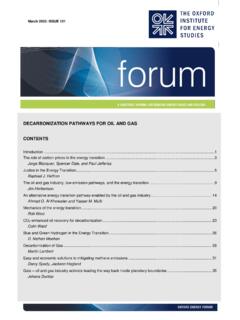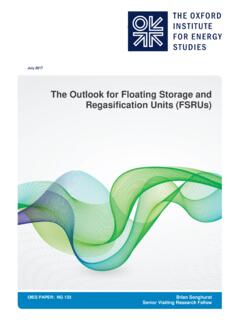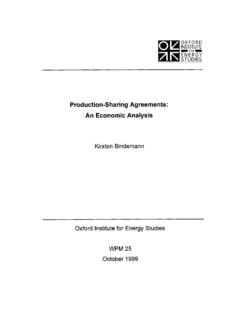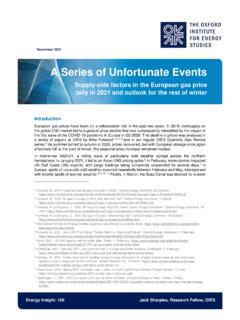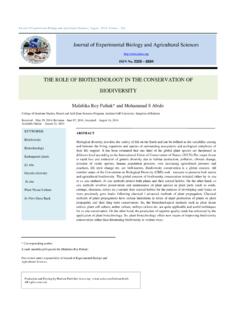Transcription of Brexit’s impact on gas markets - Oxford Institute for ...
1 January 2017 Energy Insight: 2 brexit s impact on gas markets series: 1 Thierry Bros brexit s impact on gas markets The Oxford Institute for Energy Studies is launching a new research theme on the impact of brexit on gas markets . This publication is the first of a series that will focus on this subject as negotiations continue between the UK and the EU. brexit and security of supply for UK and Ireland The future demand picture for gas is difficult to predict for both the UK and the EU1. brexit is coming at a time when UK North Sea gas production is in terminal decline and the main UK storage facility (Rough) is facing technical issues that will reduce its capacity with a possible extreme outcome, namely total decommissioning.
2 These specific issues will make the brexit negotiations even more difficult for the UK as far as gas is concerned. As the outcome of brexit is still unknown, we can only draft hypotheses ranging from a benign (soft) energy brexit with virtually no changes, through to a full (hard) energy2 brexit leading to massive changes (via solutions similar to those reached in Norway or Switzerland3). From being the leader and at the core of the EU liberalised energy market , brexit will result in the UK being outside the EU market .
3 Additionally, Ireland would also be effectively cut off from the main European Continent. This means we have to look at three energy issues relating to brexit : 1) the impact on the UK; 2) the impact on the EU-26, and 3) the impact on Ireland (which is still part of the EU but cut off by the UK from the EU energy markets ). It is also worth clarifying some terms used in this paper: 1 Please refer to The Future of Gas in Decarbonising European Energy markets : the need for a new approach by Jonathan Stern (January 2017 OIES Paper: NG 116).
4 The UK government wants to replace coal with gas in power generation which could lead to increased gas demand. 2 Energy could suffer in the crossfire as many other issues will have to be negotiated. 3 The European Free Trade Association (EFTA) is an intergovernmental organisation set up for the promotion of free trade and economic integration for the benefit of its four Member States: Iceland, Liechtenstein, Norway and Switzerland. In 1973, the UK left EFTA to join the EU. EFTA is responsible for the management of the European Economic Area (EEA) Agreement, which enables three of the four EFTA Member States (Iceland, Liechtenstein and Norway) to participate in the EU s internal market .
5 Switzerland has adopted, via treaties, various provisions of EU law in order to participate in the EU's single market . This will not be the UK option as Theresa May s Lancaster House speech on 17 January made it clear that the UK would be leaving the EU Single market and the Customs Union, and that it would negotiate a new relationship with the EU that would not equate to, partial membership of the European Union, associate membership of the European Union, or anything that leaves us half-in, half out. Nor would the government, seek to adopt a model already enjoyed by other countries.
6 The contents of this paper are the authors sole responsibility. They do not necessarily represent the views of the Oxford Institute for Energy Studies or any of its Members. 2 EU : This refers to the EU post- brexit , the 27 Member States excluding the UK. EU-264 refers to the Continental part of the EU excluding the UK and Ireland. Foreign dependency : Up until this point, UK gas has been labelled EU gas and the UK has been able to access Norwegian gas (part of the European Economic Area) and EU piped domestic gas. As soon as brexit is formally completed, the UK will still have its own domestic gas supply but will also need to access foreign gas (Norwegian and/or EU) to meet demand.
7 By applying this definition, in 2015, 42 per cent of UK demand was foreign gas. In the future, UK gas production is bound to decline and domestic shale gas production does not look promising enough to alter the trend. Foreign dependency will also become a major issue for Ireland. Until now Ireland has been getting 97 per cent5 of its gas from the UK and in the internal market this was labelled EU gas, but post- brexit , this same gas will be labelled foreign gas. And with no regas capacity, all Irish foreign gas will either have to be sourced from the UK or be transited via the UK.
8 EU-26 gas exports : So far, the EU has been a net importer of gas and the only time gas has been exported, it was in fact re-exports such as Russian gas being re-exported to Ukraine or LNG being re-loaded. Post- brexit , the UK will make up its gas shortfall by importing Norwegian gas but also EU-26 gas (a mixture of domestic and imported gas). Foreign dependency : Post brexit vs 2015 EU-28 situation Source: Net flows from BP Statistical Review June 2016, In short, post- brexit , EU-26 would be slightly more dependent on foreign gas than the former EU-28 but both the UK and Ireland would be much worse off.
9 From being hardly foreign dependent at all, the UK and Ireland would become respectively 42 and 97 per cent dependent on foreign gas. In a world awash with LNG (at least after the brexit outcome), the issue of security of supply is not the primary issue in brexit negotiations. But as the LNG supply and demand balance is forecast to tighten during the 2020s, the UK and Irish6 agendas should then be concentrated on security of supply as: 1) the NBP would have moved from being a major international hub to a regional one with less liquidity than 4 In EU-26, Cyprus has no gas business, and Malta is just starting to import LNG.
10 5 The Corrib gas field that started in December 2015, will greatly enhance Ireland s security of supply in the short-term. But post 2020, Ireland is likely to remain largely dependent on imported gas. Electricity generation in Ireland relies mainly on gas, with 42 per cent of the electricity generated coming from gas in 2015. 6 Although with an estimated 20-year life for Corrib field, production rates will begin to decline after 5 years. 0%20%40%60%80%100%0501001502002503003504 00 UKIrelandEU-26EU-28 Domestic Production (bcm)Norwegian gas (bcm)Other gas (bcm)Foreign dependency (%)The contents of this paper are the authors sole responsibility.




